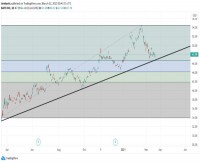|
Opalesque Industry Update – Over past few weeks, there has been enormous pressure on the Greek government, as Greece’s unsustainable debt levels, which dwindled down investor confidence, pushed the country into a debt crisis, the Telegraph reported. Yesterday, Eurozone finance ministers put pressure on Greece to fully implement planned budget deficit cuts and avoid any bailout. "The Council therefore calls on Greece to design and implement as soon as possible, starting in 2010, a bold and comprehensive structural reform package. It sets out specific measures, covering wages, pension reform, healthcare reforms, public administrations, the product market, the business environment, productivity and employment growth," according to the statement issued by EU finance ministers after yesterday’s crucial meeting between EU financial ministers in Brussels. In one month from now, the European Commission will re-evaluate the situation again and will see if it is necessary for Greece to take more measures. Bailout for Greece was not ruled out completely. Greece has promised to reduce the budget deficit below 3% by 2012. It has also set a target to reduce the deficit to 8.7% of GDP in 2010 from the estimated 12.7% budget deficit for 2009 through various measures, including wage cuts, tax reforms, and pension reforms. But, this sparked loud protest within the country; the customs officials called a three-day strike, starting yesterday (16-Feb), and this might hamper imports and exports. In recent weeks, the euro took a hit, sending ripples across global markets. It has shed nearly 5% against the dollar since the beginning of 2010, which has impacted banks and other institutions with broad exposure to the sovereign debt of the European countries in Portugal, Ireland, Greece and Spain (PIGS). This could further lead to an adverse impact on the rest of the world, such as higher borrowing costs and a destabilization of currency markets, according to a Business Standard report on 13-Feb. The Greek economy shrank by 1.2% in 2009, but Athens started with a deficit of 7.7% of GDP in 2008, which rose to 12.7% in 2009. The market fears that the Greek crisis could give way to an all-out attack on the euro as it emerged that currency speculators had increased their bets against the currency to the highest level since the euro creation. Contracts on the Chicago Mercantile Exchange (CME) showed that in the past week, net short positions against the euro rose from 39,500 contracts to 43,700 – worth €5.5bn ($7.5bn). Nobel laureate Joseph E. Stiglitz, a Columbia University professor who is advising the Greek government, came down heavily on speculators while speaking in an interview on 2-Feb in Athens: “The EU should announce that it will back Greece with financial support to end attacks by hedge funds and other speculators that have driven down the euro. If it made that announcement, then the speculators would know there’s no more hope and they would just go away. It would cost nobody.” There was also a disagreement over how to restore market confidence in Greece, The Times reported last week. While Netherlands wanted the IMF to intervene, Angela Merkel, the German Chancellor, opposed that view. Merkel’s view was endorsed by EU’s new President, Herman Van Rompuy, who believes that the problem should be settled among the 16 nations of the eurozone rather than seeking Washington’s help. As a long-term solution, he suggested an IMF-style establishment – the European monetary fund - to avoid the need of calling the IMF to save the euro. The International Monetary Fund on Friday joined the European Union in pledging support for Greece, although without stating any specific plan either. However, Luxembourg Prime Minister Jean-Claude Juncker, who heads economy talks between the eurozone nations said any IMF involvement would be limited, and talk of a loan from the IMF was "absurd" for a country using the euro, reported AP. Last week the euro showed some recovery against the dollar buoyed by the expectation of a multi-billion pound bailout package for Greece. Investor had anticipated an aid package for Greece and wanted further clarity and details on this from yesterday’s meeting. Although no bail-out package was announced in yesterday’s (16-Feb) meeting, the euro was still up 0.4% on Tuesday against the dollar at $1.3647. It remained weak but so far this week it has stayed above Friday's nine-month low of $1.3532, Reuters said . Investors were certainly disappointed with the lack of bail-out package, which raised their apprehensions about the country’s inability to repay debts. This lack of confidence was reflected through widening of the spread of the Greek government bond to 3.35 percentage points against the benchmark German bond, according to an Associated Press report. The spread was below 3.00 points last week on hopes of a detailed eurozone bailout plan. As another consequence of the Greek debt-crisis, the Athens Stock Exchange introduced stricter norms to restrict short-sellers. The main stock lending interest rate was increased from 2.5% to 5.5% on 11-Feb for all new lending contracts to be traded after this date, the FT reported. – SC –
|
Industry Updates
EU leaders put pressure on Greece to implement budget deficit cuts and avoid bailout
Wednesday, February 17, 2010
|
|





 RSS
RSS







